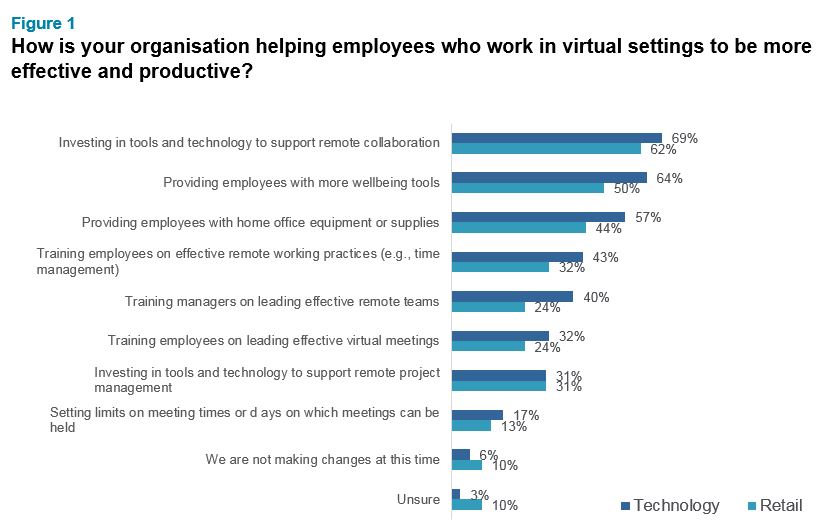Originally published in The Retailer magazine, we discuss how agile workforce strategies, including virtual working, flexibility and aligned benefits, can help retailers succeed in the post-pandemic world.

When the COVID-19 pandemic forced a lockdown across Europe and the United States in March, retail businesses were forced to react and respond to a crisis few had anticipated. This initial stage — the first of three detailed in Aon’s COVID-19 Crisis Management Model — demanded reaction to the immediate needs of the organisation and its employees. In June, as the pandemic progressed, the majority of retail businesses (63%, according to Aon’s COVID-19 Pulse Survey) had moved on to the second stage of recovery, with a focus on stabilizing the business.
Towards the end of summer, 28% of retailers had shifted their focus to the critical third stage of reshaping their future — where companies focus on restructuring, creating or pivoting to new product and service offerings, and deploying new talent strategies. However, challenges remain. Only 52% of retailers globally said they plan to bring back at least 75% of their furloughed workforce in the next six months, according to Aon’s COVID-19 Pulse Survey #5, conducted at the end of August. There is now a need to build efficiencies with fewer resources. Given these pressures, it’s clear that a successful “reshape” strategy will depend on retailers evolving to a more digital ready and agile workforce.
Building an Agile Workforce
While it is good news that nine out of 10 retailers believe that agility is critical to their future, this conviction does not always translate into action. Our August pulse survey found that half of technology firms consider themselves extremely or very agile, while only 34% of retailers think the same. Just under two thirds (60%) of retailers see themselves as moderately agile with room to improve. So, how can they go about achieving their aim of being more agile?
A greater investment in technology infrastructure is often the first priority. Our survey supports this conclusion with 91% of retailers rating it as important or very important. There are, however, other high-ranking human capital-based initiatives that can have a big impact on the quest for agility and often cost much less and are faster to implement such as virtual working, flexible working schedules, improved benefits and effective communications.
Virtual Working
More than half of retailers now provide ongoing flexibility to work in the office or virtually and nearly eight out of 10 are now identifying roles that can operate well remotely. To support this switch, 62% are investing in tools and technology to support remote collaboration. Despite this, retailers are behind technology firms in terms of helping employees who work in virtual settings to be more effective and productive. One in five retailers are not making changes or are unsure about how to support virtual working, while less than one in 10 technology firms are in the same position.
In almost all the actions they took, retailers were not as quick as technology firms in terms of introducing short-term measures supporting virtual working. Gaps exist, particularly for the actions taken in training managers on leading effective virtual teams and providing employees with more wellbeing tools. Addressing these shortcomings can help improve the virtual working experience.

Source: Aon COVID-19 Pulse Survey #5, August 17-25. To access complimentary results, please visit: rewards.aon.com/sites/reports/covid-19-pulse-survey-5
Be More Flexible
The ability to flex hours for employees can play a key role in becoming more agile and Aon’s research showed that more than 65% of retailers have implemented or are considering implementing a form of flexible work schedules. Of those, 53% are allowing their employees to further flex their working hours, either permanently or temporarily, while 62% can do so with their manager’s approval. We find these figures encouraging, however, the tech sector scores better with 73% of companies having implemented or are considering flex work.
Align Employee Benefits
When it comes to provision for employees with children, it’s a surprise that more is not being done to support them given the particularly disruptive nature of long-term school closures on employee productivity. One third of retailers surveyed said they were not prepared to support employees who were not able to send their children to school or child care as a result of the pandemic. Given the prolonged and continued uncertainty of the pandemic, the provision of childcare assistance programs could be invaluable given the disruptive nature of school and nursery closures.
Improved Communication
Underpinning all this should be a focus on great ongoing and multi-channel communication. When asked what factors are most important to building and maintaining an agile workforce, having the communications infrastructure and tools was considered highest, with 93% of retailers surveyed ranking it as very important or extremely important.
A Catalyst For Change
Retail companies have quickly responded to the impact of COVID-19 on their workforce, but more remains to be done. As it becomes clear the pandemic (and its lasting impact) is not going away anytime soon, retailers must accelerate their long-term transformation plans. There is more they can do to become more agile to achieve the change needed.
Imagine a parallel universe where there was no pandemic. The evolution of the retail industry we’re seeing now would have happened eventually with its winners and losers. The difference is that the pandemic is forcing these changes today on everyone in the industry, and the winners will be the businesses who quickly adapt and integrate agility throughout their operations.
To learn more about participating in a survey or to speak with one of our experts, please write to rewards-solutions@aon.com.
Related Articles